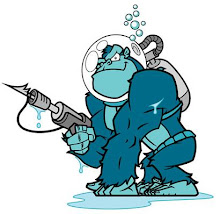International Composting Awareness Week (Sunday 3rd to Saturday 9th May 2009) is a week of activities, events and publicity to improve awareness about the importance of this valuable organic resource and to promote compost use, knowledge and products.
Approximately 60% of the rubbish Australians put in the everyday mixed-waste ‘garbage bin’ could be put to better use in the garden as compost and mulch or could be returned to agricultural land to improve soil quality.
Alarmingly, such a huge amount of organically-active material buried ‘anaerobically’ (without air) in landfill causes over 3% of Australia’s total greenhouse gas emissions annually by producing methane: a gas with 25 times the global warming potential of carbon dioxide! If properly composted instead, this same organic waste could help to abate climate change in yet another way: by sinking or ‘sequestering’ carbon back into the soil.
And if combating climate change with compost isn’t impressive enough, using compost on land reduces the need for water by an average of 30%!
Compost products can also regenerate ravaged areas (like mining or salinity effected sites) and can even be used to help clean storm water before it travels into the ocean (as is the case at North Steyne beach in New South Wales).
See - http://www.manly.nsw.gov.au/Stormwater-Treatment-and-Re-Use.html
Composting is the intelligent alternative. We can compost to combat climate change and reduce our irrigation needs while we’re at it. Composting is the responsible and sustainable thing to do for our planet.
DOWNLOADABLE RESOURCES
- 2009 A4 Poster (PDF 1MB)
- Benefits of Compost: Fact Sheet (PDF 560 KB)
- Fact sheet - Conserving water using compost materials - SPD_ORG_ConsvWaterCompost_FS.pdf (PDF 189 KB)
- Fact sheet - Reducing soil erosion using compost materials - SPD_ORG_SoilErosion_FS.pdf (PDF 180 KB)
- Fact sheet - Sustainable landscaping using compost material - SPD_ORG_LandscapCompost_FS.pdf (PDF 164 KB)
- Fact sheet - Using compost materials for sustainable viticulture - SPD_ORG_ViticultCompost_FS.pdf (PDF 147 KB)
EVENTS IN OTHER COUNTRIES
United Kingdom - The Composting Association UK ||Canada - Composting Council of Canada ||
United States - US Composting Council
International Composting Awareness Week: Home Page

Comments